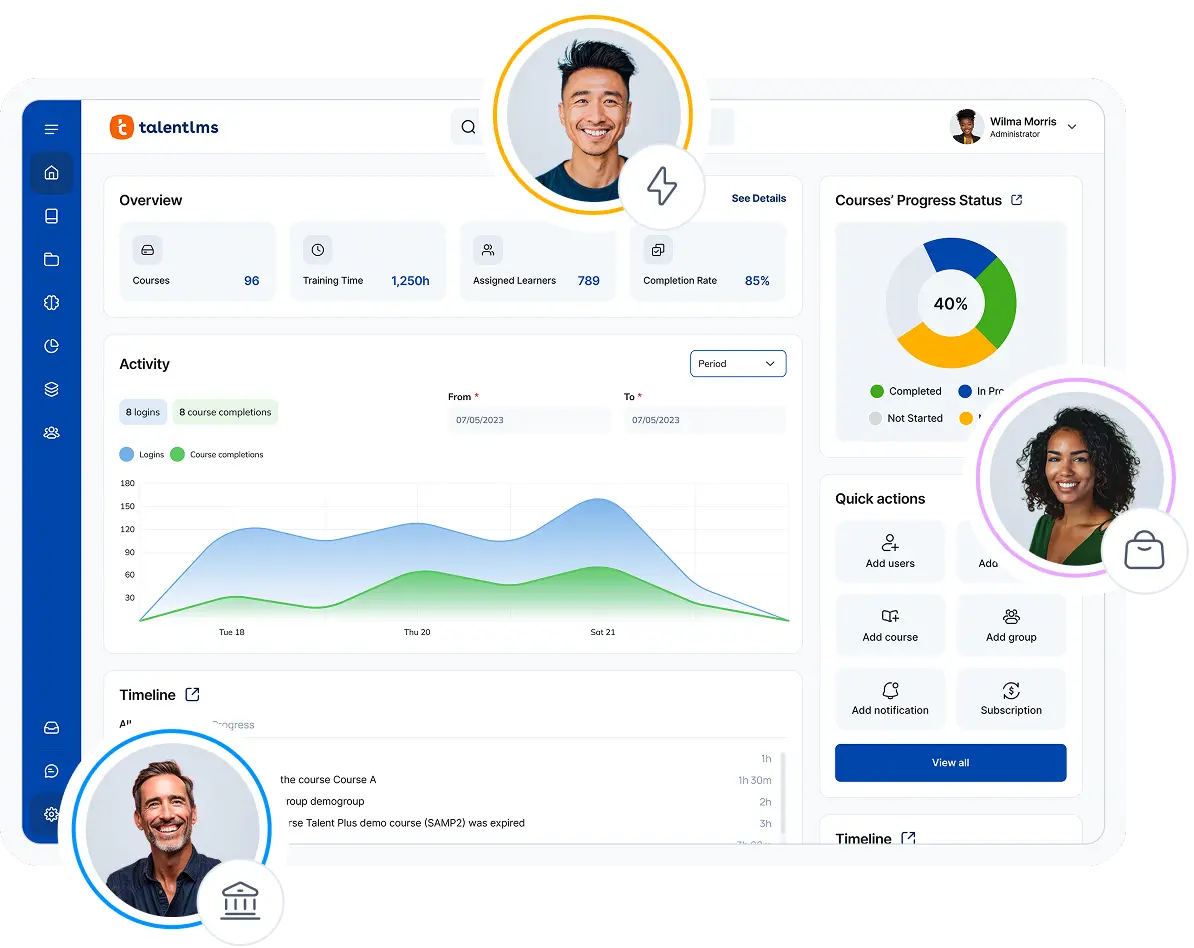- What does the current landscape of in-demand skills look like now?
- Top hard and soft skills for 2026 and beyond
- Why are in-demand skills important?
- Hard (technical) skills
- Soft skills
- How to close skill gaps in your organization for a future-ready workforce
- Future-ready starts now by building in-demand skills
Workplaces are changing quickly. And with technology reshaping jobs, uncertainty has become the new normal. Mastering in-demand skills is essential for job security and career growth.
AI tools and automation aren’t just buzzwords anymore—they’re transforming workflows. In fact, AI is changing key in-demand skills. 64% of HR managers agree. For many, these tools feel like helpful partners. They streamline tasks, boost flexibility, and increase productivity.
This shift is also redefining training. It’s no longer just about technical skills. The focus is on fostering human-AI collaboration and balancing hard and soft skills. Adaptability, critical thinking, and emotional intelligence are just as vital as technical know-how.
What does the current landscape of in-demand skills look like now?
The global workforce in 2025 will navigate a turbulent landscape shaped by rapid technological advancements and shifting industry demands. Generative AI, automation, and digital tools are redefining jobs and highlighting the need for adaptable, critical thinkers. Employers hire employees who combine technical skills with soft skills, like strong collaboration and problem-solving abilities.
Organizations are addressing these challenges through skills gap analyses. These help identify gaps and guide targeted training. By building innovation, leadership, and resilience skills, businesses stay competitive and prepare employees for new opportunities.
Top hard and soft skills for 2026 and beyond
| Hard skills | Soft skills |
|---|---|
| AI skills | Critical thinking and problem-solving |
| Artificial Intelligence (AI) and Machine Learning (ML) | Adaptability and flexibility |
| Data analysis and Big Data | Growth mindset and continuous learning |
| Cloud computing | Effective communication |
| Cybersecurity | Creativity and innovation |
| Software and web development skills | Emotional intelligence (EQ) |
| Digital marketing | Leadership and social influence |
| Blockchain technology | Resilience and stress tolerance |
| User Experience (UX) design | Collaboration and teamwork |
| Robotics and automation | Cultural Intelligence (CQ) |
| Augmented Reality (AR) and Virtual Reality (VR) | Time management and project management |
Why are in-demand skills important?
For employers, in-demand skills are the foundation of success. A skilled workforce drives better results, fuels faster growth, and ensures a competitive edge in today’s ever-changing landscape.
For employees, these skills are the key to staying ahead. They help individuals adapt, innovate, and confidently tackle new challenges. Which opens doors to new opportunities and provides security in an unpredictable job market.
Simply put, in-demand skills aren’t just important—they’re essential for success.
Let’s explore in detail what skills are in demand in 2025.
Hard (technical) skills
Hard skills are specific, measurable abilities or knowledge areas, such as coding, data analysis, accounting, or proficiency in a foreign language. These are often gained through education or technical skills training.
Here are the top in-demand hard skills for future jobs:
1. AI skills
AI skills are by far the most important skills for 2026 and beyond. AI has inflitrated the workplace and impacted every job. From content writing to web development, every employee has used AI in some way, shape, or form. And the harsh reality is that if employees want to keep being product and relevant in the modern workforce, they’ll need to upskill fast, otherwise they’ll be struggling to keep up in times and become almost “irrelevant”.
2. Artificial Intelligence (AI) and Machine Learning (ML)
AI technology and machine learning are transforming industries with smarter, more informed decisions, predictive analytics, and automation. They power tools like chatbots, recommendation engines, and fraud detection systems. Professionals skilled in AI technology or generative AI can design algorithms and build models in their jobs that improve efficiency.
3. Data analysis and Big Data
Data drives decision-making in every industry. Skills in analyzing big data help businesses uncover trends, optimize strategies, and solve problems. SQL, R, and Python are essential for jobs that involve large datasets.
4. Cloud computing
Cloud computing is the backbone of modern business and careers. It allows companies to store, access, and manage data securely and at scale. Skills in platforms like AWS, Google Cloud, and Microsoft Azure are in high demand in current jobs.
5. Cybersecurity
Another top skill that gains popularity among in-demand skills for businesses is cybersecurity. As cyber threats grow in number and sophistication, cybersecurity skills are more critical than ever. Professionals protect sensitive data, prevent breaches, and manage risks. Expertise in ethical hacking, threat analysis, and incident response is crucial. Certifications like CISSP (Certified Information Systems Security Professional) or CEH (Certified Ethical Hacker) can set people apart in their careers.
6. Software and web development skills
Software development shapes everything from apps to entire systems. Skill sets in languages like Java, Python, and JavaScript are highly valued. Developers also need to understand agile methods and DevOps tools.
7. Digital marketing
Digital marketing connects brands with audiences in creative, data-driven ways. Skills in SEO, social media management, and content creation are key. Knowledge of analytics and platforms like Google Ads can help track success. Certifications from Google or HubSpot are great for showcasing expertise among businesses.
8. Blockchain technology
Blockchain is revolutionizing data security and transparency in businesses. It’s widely used in finance, supply chain, and healthcare. Skills in blockchain development and smart contract programming are in demand by employers.
9. User Experience (UX) design
UX design ensures products are easy and enjoyable to use. It involves wireframing, prototyping, and user testing. Knowing how to use specific UX design software is essential for creating seamless experiences. Boot camps and certifications in UX design can help people break into this creative field.
10. Robotics and automation
Robotics and automation are reshaping industries like manufacturing and logistics. These skills involve programming robots, integrating systems, and designing workflows.
11. Augmented Reality (AR) and Virtual Reality (VR)
AR and VR are creating immersive experiences in gaming, education, and training. Advance skills in 3D modeling, development platforms, and interaction design are key for forward-thinking businesses and jobs.
Soft skills
Soft skills are interpersonal and emotional abilities, such as communication, teamwork, adaptability, and problem-solving. These allow individuals to interact and collaborate effectively, and this is why soft skills training is a top priority in a company.
Here are the top in-demand soft skills for the future:
12. Critical thinking and problem-solving
Critical thinking helps individuals analyze information and make decisions. It’s essential for solving complex problems at work. Courses in logic or decision-making can sharpen this skill.
13. Adaptability and flexibility
Workplaces are constantly changing. Adaptability allows people to better adjust to new tools, roles, and situations. Flexibility makes individuals more open to change and eager to learn. Employees should step out of their comfort zone or take on varied tasks to build these high level skills.
14. Growth mindset and continuous learning
The market is constantly evolving, and lately, it’s been changing exponentially. To tackle this imbalance of tech growth versus skills, employees need to embrace that change is the only constant now. To combat it, they’ll need to keep learning and carving out time to self-improve and ask for feedback. Leadership agrees: according to a TalentLMS report on the Growth Mindset in the Workplace, 80% of executives agree that employees’ growth mindset directly contributes to revenue growth. This means that a growth mindset and continuous learning actively impact business results.
15. Effective communication
Good communication ensures ideas are understood. It’s about listening actively and expressing yourself clearly. The focus should be on both verbal and written communication. To improve this skill in advance, individuals should join public speaking groups or take writing workshops.
16. Creativity and innovation
Creativity drives fresh ideas. Innovation turns those ideas into action in businesses. These valuable skills are crucial for solving problems in unique ways. Brainstorming techniques, creative hobbies, or design thinking workshops significantly boost them.
17. Emotional intelligence (EQ)
Emotional intelligence helps people understand and manage emotions—theirs and others’. It’s key for building relationships and resolving conflicts. To boost emotional intelligence skills, employees should practice empathy and active listening. Reading books on EQ or taking emotional intelligence courses can help.
18. Leadership and social influence
Leadership isn’t just about authority. It’s about inspiring and guiding others. Social influence helps individuals persuade and motivate people effectively. To develop such valuable skills, employees must practice giving feedback, taking initiative, and working with diverse teams.
19. Resilience and stress tolerance
Resilience allows people to bounce back from setbacks. Stress tolerance helps stay calm under pressure.
When individuals manage their time well and practice mindfulness, they steadily improve these high-in-demand skills. Other techniques include journaling and stress management courses.
20. Collaboration and teamwork
Teamwork is about working well with others. Collaboration means leveraging diverse skills to achieve shared goals. To improve, focus on clear communication, respect, and reliability. Joining team projects or group activities can help people practice.
21. Cultural Intelligence (CQ)
Cultural intelligence helps people work effectively across cultures. It’s about respecting diversity and adapting to different norms. Employees learn by interacting with people from various backgrounds or studying global workplace trends.
22. Time management and project management
Time management skills are essential to be able to focus on what matters most. Prioritization in project management ensures people complete high-impact tasks first. To achieve this, employees should learn to use to-do lists and calendars. Courses in productivity or apps can refine people’s approach.
TalentLibrary – Skills that matter, courses that deliver
With TalentLibrary, you set the foundation for a strong, aligned workforce—soft skills, compliance, and workplace essentials, from day one (and beyond).
How to close skill gaps in your organization for a future-ready workforce
Addressing skill gaps is key to staying competitive in a fast-changing workplace.
Here’s how L&D professionals and HR managers can make it happen:
Assess skill gaps
Identifying skill gaps is the first step in building a future-ready workforce.
- Conduct a skills gap analysis: Compare current employee skills to what’s required now and in the future
- Use data-driven tools: Surveys, performance reviews, and 360-degree feedback can highlight areas for improvement
- Benchmark against industry standards: Identify emerging trends and ensure your workforce is aligned with market demands
Create personalized learning paths
One-size-fits-all training doesn’t work anymore. Personalized learning paths help employees grow faster and more effectively.
- Understand employee needs: Identify individual goals, career aspirations, and learning preferences
- Mix learning formats: Combine self-paced eLearning, instructor-led sessions, and peer mentoring
- Use AI-driven recommendations: Leverage AI to suggest courses and resources, generate content, and more based on employee profiles

Leverage technology
New technologies are your ally in closing skill gaps efficiently and at scale.
- Invest in an LMS: A Learning Management System centralizes training and tracks employee progress
- Foster collaboration: Use virtual training platforms to encourage teamwork and knowledge sharing, even for remote employees
Focus on continuous development
Skill-building shouldn’t be a one-off initiative. A culture of continuous learning ensures employees are always growing.
- Offer microlearning opportunities: Bite-sized training modules make it easier for employees to learn on the go
- Encourage practice: Provide hands-on opportunities for employees to apply new skills in real scenarios
- Celebrate progress: Recognize and reward milestones to keep employees engaged and motivated
Evaluate and adjust
Regular evaluation helps businesses fine-tune training programs and ensure they remain effective.
- Track training outcomes: Use metrics like skill proficiency, performance improvement, and retention rates
- Gather employee feedback: Listen to learners to understand what’s working and what isn’t
- Stay aligned with goals: Update training programs to reflect organizational changes and evolving priorities
Future-ready starts now by building in-demand skills
The future belongs to those who adapt, learn, and innovate. In 2025, the race of businesses and employees alike to stay competitive boils down to in-demand skills.
Employees need a balance of technical expertise and human-centric abilities to thrive in this tech-driven era. From mastering AI to honing emotional intelligence, organizations that embrace continuous learning and close skill gaps will lead the way.
Start today by equipping your workforce with what they need to not just survive but excel in their careers and workplaces.
Originally published on: 19 Jan 2023 | Tags: Employee Training,hard skills,learning and development,Soft Skills Development



